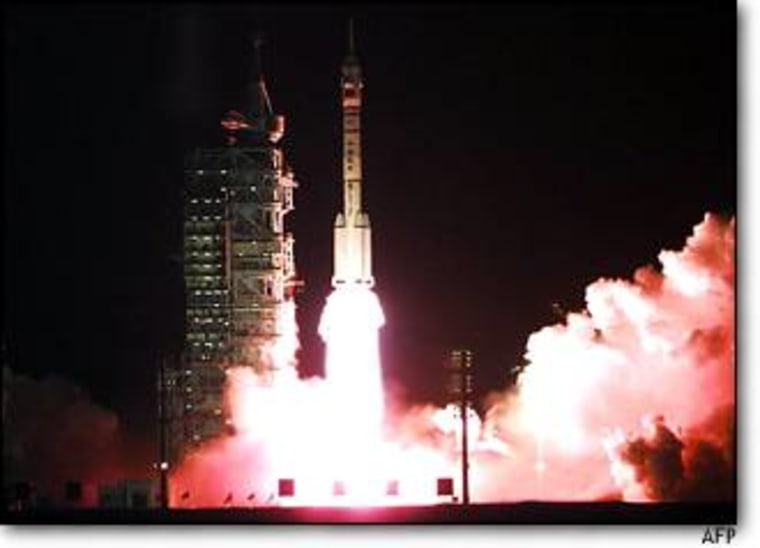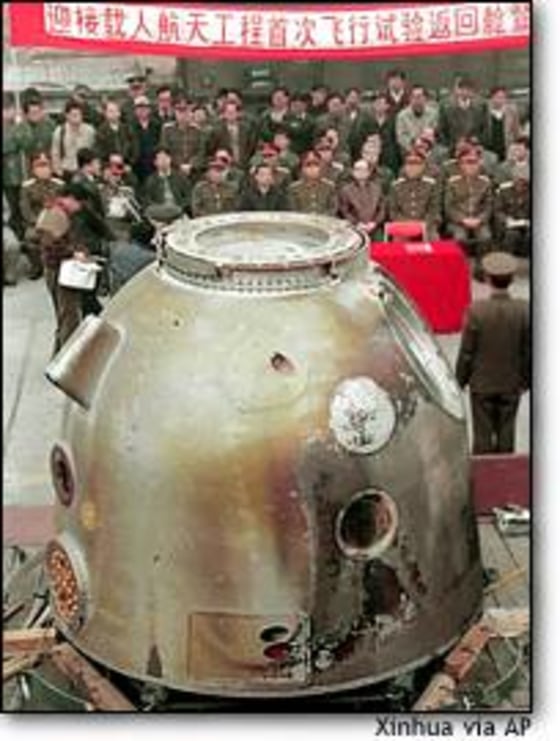China’s launch of an unmanned space capsule sets the stage for putting humans into orbit, U.S. intelligence officials and space policy experts say. In the wake of the successful test, U.S. officials told NBC News that the Chinese military is showing increasing interest in using manned spacecraft for reconnaissance.
Ending months of speculation, the Chinese sent an experimental spacecraft into orbit Saturday from their Jiuquan satellite launch complex in the Gobi Desert, the Xinhua News Agency announced. The launch vehicle was China’s new Long March 2F rocket, under development for more than a year.
Xinhua said the dome-shaped Shenzhou spacecraft, modeled after the Russian Soyuz capsule, orbited Earth 14 times and touched down safely in the Chinese province of Inner Mongolia, 21 hours after launch.
The achievement brought the Chinese one giant leap closer to membership in the world’s exclusive club of spacefaring nations. Currently, there are only two members: the United States and Russia.
Word of the long-awaited launch came only after the flight was completed. State television showed only simulated pictures of the module descending by parachute, with four retro rockets bursting into flames shortly before landing.
Pride in Beijing
On the streets of Beijing, the news was greeted with pride. “Shenzhou” literally means “heavenly ship,” but the characters that make up the name also sound the same as a name for China.
“Fifty years ago Chairman Mao Zedong declared that ‘the Chinese people have stood up,’” Zhao Ren, a 63-year-old retired official, told the Reuters news service. “Now the Chinese people have flown up into space.”

“I don’t know much about what spacecraft do, but anything that thrusts us forward to the likes of the United States and Russia in technology is wonderful,” said a taxi driver waiting outside a hotel in the capital.
China has been sending astronaut trainees to Russia for the past four years, and in the wake of the launch, some experts said a manned space mission could come within months. U.S. intelligence officials were more circumspect, however.
“The Chinese have said they plan multiple unmanned tests prior to a manned test,” one official told NBC News on condition of anonymity. “Since this was their first, the analysis is that a manned launch will come next year at the earliest.”
That was in line with an assessment from Charles Vick, senior research analyst at the space defense policy office of the Washington-based Federation of American Scientists. “They would be very foolish not to run several flight tests before they launch it manned,” he said.
Military implications
Experts inside and outside the U.S. government say the Chinese space program could have an impact far beyond public relations. A recent Pentagon report on China’s space effort noted that “manned space efforts could contribute to improved military space programs in the 2010-2020 time frame.”
“The have talked about military space technology,” one official told NBC News. “Specifically, they are interested in satellite reconnaissance, calling for the development of a ‘multipurpose manned military system’ — like the Manned Orbiting Laboratory we planned.”
The Manned Orbiting Laboratory would have had military astronauts spy on world trouble spots from space, doing some initial analysis of the imagery aboard the large spacecraft. The program was killed in the 1970s because of the high cost of combining a spaceborne spy camera with a manned craft. The U.S. official acknowledged that the Chinese would face similar kinds of financial and technical challenges, requiring years of development.
Space arms race?
The China Business Times, which is run by Beijing’s government, noted another military implication of space flight.
The same low-power propulsion technology used to adjust a spacecraft’s orbit could also be used to alter the path of offensive missiles, helping them evade proposed U.S. anti-missile defense systems, military expert Song Yichang told the state-run China Business Times.
“We can use this technology to change trajectories in flight, making missiles do a little dance and evade opponents’ attacks,” the newspaper said.
Missile defense systems are designed to shoot down incoming missiles. The Clinton administration, with the support of Congress, is developing a limited national missile defense that could be deployed as early as 2005. It also is carrying out research with Japan on a regional missile defense.
China is vehemently opposed to both systems, saying they could spark a costly and dangerous arms race. It also fears that regional missile defense technology could be passed on to Taiwan, allowing the island that Beijing regards as a renegade province to defend itself against Chinese missiles.
Long-term role
In any case, experts believe that China intends to play a long-term role on the space frontier. Diagrams and artist’s conceptions indicate that the Chinese are considering the full complement of space vehicles — including a space station based on Russian designs.
As early as 2001 or 2002, the nation is likely to put into orbit a small lab that future crews can visit, Clark said. And some predict that the Chinese could try to put a human on the moon by the year 2010.
“Early in the next century, the Chinese expect to have a ‘space plane’ and a lunar lander. A trip to Mars is also being considered,” said William C. Triplett, co-author of “Year of the Rat,” a book on Chinese attempts to obtain Western military technology.
“All of that has military significance,” he said.
Robert Windrem is an NBC News investigative producer. Alan Boyle is science editor for MSNBC on the Internet. The Associated Press and Reuters contributed to this report. Keep up with the universe at Space.MSNBC.Com
